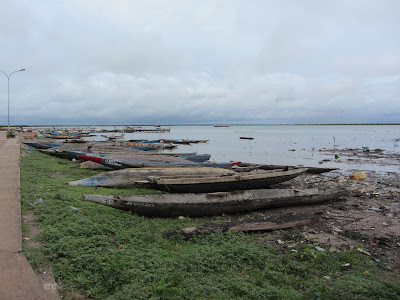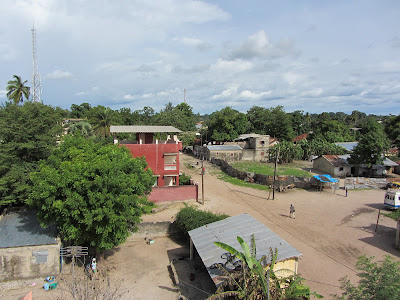The friendliness and generousity of people in Senegal cannot go unnoticed. Unfortuntaely, with my limited (or should I say, lack of) French, the only appreciation I seem to be able to show is "merci", or the occassional "merci beaucoup". It just doesn't seem to do it justice.
 |
| Ziguinchor on final approach |
For the past week, I was down with the local IT Officer (who essentially heads the IT in the WFP Country Office) at the sub-office in Ziguinchor. WFP has 3 sub-offices in Senegal outside of Dakar - this is one of the longer standing ones. Ziguinchor is located in the Casamance province, the area between The Gambia and Guinea Bissau. It's a significant, but small town, a little bit inland from the popular tourist destination of Cap Skirring (a town that I unfortunately could not make it to on the weekend due to recent attacks on the road between Ziguinchor and the coast. There has been on and off fighting in the region between separatists and the government for around 3 decades now. So although Casamance is one of the more flourishing regions of Senegal agriculturally, the fighting has meant that people focus more on protecting themselves, than agriculture. Therefore, minor food problems here get exacerbated. Consequently, WFP has a role to play here.
 |
| The lush green Casamance Region |

Despite what some may call a civil war going on, Ziguinchor is particularly peaceful - seemingly more so than Dakar. Here I am told I can walk around the town centre any time of the day or night (my hotel is around the corner from the heavily gaurded central bank compound - so I'm told I should feel even safer). I walk to and from the office (when the weather doesn't suffocate me) and only get hassled by hawkers around half a dozen times each way (as opposed to hundreds in Dakar). At least I think they are all hawkers - not understanding them does have some benefits! The town is, what would be described in Western Europe, as a dump. But it's actually not too bad. There are a handful of paved roads, but the ratio of potholes to flat road is quite amazing. I would not be exagherating if I said that you cannot drive more than 5m without hitting a pothole - and not some shitty little dip, I'm talking about a pothole 2m in diameter and at least a foot deep! Basically, the roads are rough and the taxies have no suspension left!
 |
| Together with the local staff |
The office here is great. In this small office, everyone greets each other in the morning with the standard "bonjour. ca va?", "ca va" and a handshake. Or variants thereof (by the way - all French in this blog will be written phoeniteically until I know better!) A special effort is made to try and ask me something extra in French (those who are determined I should learn French) or English (those who are determined to improve their English). This "ça va" greeting is so unbelievably common here. It roughly translates to "g'day, howzit going?", "good mate, and you?". Basically, everyone says it to each other, but the only response you're allowed to give is "ça va". No one really wants to know how things are, it's just not part of the question. All cultures seem to do this, this is the local way.
 |
| One of two 'leather goods' shops across the road from my hotel. |
Throughout the day at work the kindness continues. Most significantly is the
Senegalese tea I receive each evening that I'm working in the office late. The guard will brew his tea outside, and bring a glass (a small glass, roughly double the size of a standard shot glass) filled with frothy tea up for me. This deliciously concoction of a slightly sweet, minty, herby, spity tea tastes especially nice. He will then collect the glass, and a few minutes later bring up the next glass. Slightly sweeter than the first. Then eventually the third glass comes up - even sweeter (naturally, my favourite).
 |
| The start of a magnificent evening storm |
 |
| The river is a major source of fish |
Afternoon tea here is a national sport. Much like dodging tax is in Greece, and being unemployed is in Spain. What is special about is demonstrated in the coffee drinking (or rather, the making) too - through the endless servings of instant Nescafe on the sidewalks (going at 10c a pop). Key isn't the ingrediants, but in the frothing of the tea/coffee. It is achieved by endlessly pouring the liquid from one tiny cup/glass to another, from great heights. Think of playing with a slinky and moving it between your two hands - this is what the tea/coffee mixing looks like from afar. A closer view reveals that it is indeed liquid that appears to be magically flying between the cups, without a single molocule spilling. Talk about talent!

So back to the generosity. Apart from the tea, I have been fed some beautiful 'things' (I still don't quite know what they are) which look like fried fishballs but taste of some kind of bean. Then there is the wonderul 'mad' fruit (no idea what this is in any language I'm familiar with) which grows all over the place here in Ziguinchor - made into an ice cold juice for me. The coconut milk with tonic water, and coconut flesh provided in the evenings, the fresh mangoes - it is all a bit non-stop! I can't show my appreciation enough.
 |
| The donkey - a common mode of transport |
 |
| WFP's wireless communication installation in Ziguinchor |
So onto what I'm actually doing here.... The week down in Ziguinchor has been, what I think will be typical of most of my work here - being an extra pair of hands with regards to making IT stuff for the WFP country office 'work'. This has meant I have been involved with upgrading office connectivity, deploying new laptops to staff, installing and configuring servers, liaising with headquarters units in various teams in both Italy and India, helping people do things on their computers (changing passwords, logging on, installing software, etc). What I have learnt from this is that the local IT Officer has a lot on his plate - he is certainly a jack of all trades. He has shown me that it is possible to know how to ste up and configure everything from the power supplies, to the radio networks, to the telephone systems, to the antiquated Domino mail servers, the user laptops, manage the cabling, and many more things. Nothing is done perfectly here, but things are certainly done!

This leads on to the second part of my role here. Apart from providing an extra pair of hands, I will hopefully be able to impart just a little bit of my anal engineering attitude towards processes, documentation and standards into an environment where very little is planned because time and resources have not previously allowed it. Things get done, but not always in the best possible way from an academic point of view. There is certainly some scope for improvement, and I believe this has only come about recently due to the rapid expansion of operations in the country and the consequent explanation of the IT team. Maybe, just maybe, I can leave something good here. It's a high aim, but I'll certainly try.
 |
| The rooftop terrace |
Finally, back in Dakar, I have moved into what I hope will be my permanent accommodation for the duration of my stay here. It's a
guest-house, part way between a hotel and a share apartment. I have my own room and bathroom, but then there are a number of common rooms, kitchen, rooftop terrace and swimming pool. I think there are around 10 rooms altogether, so it's quite intimate. Most importantly, despite the price, it has the standards I have come to define as important: cleanliness, a reasonable bathroom, air-conditioning (and one that isn't old and noisy), space to cook if I want to, and in the area of the office (I am within walking distance). So whilst not perfect (for example, there isn't a heck of a lot of natural light in my room), I think it will end up being a reasonable base for me.
 |
| Looking over the suburb of Mamelles (literally, 'breasts') from my new dig - one with what I think is mainland Africa's Western-most lighthouse, and the other with the Africa Renaissance Monument. |

















No comments:
Post a Comment